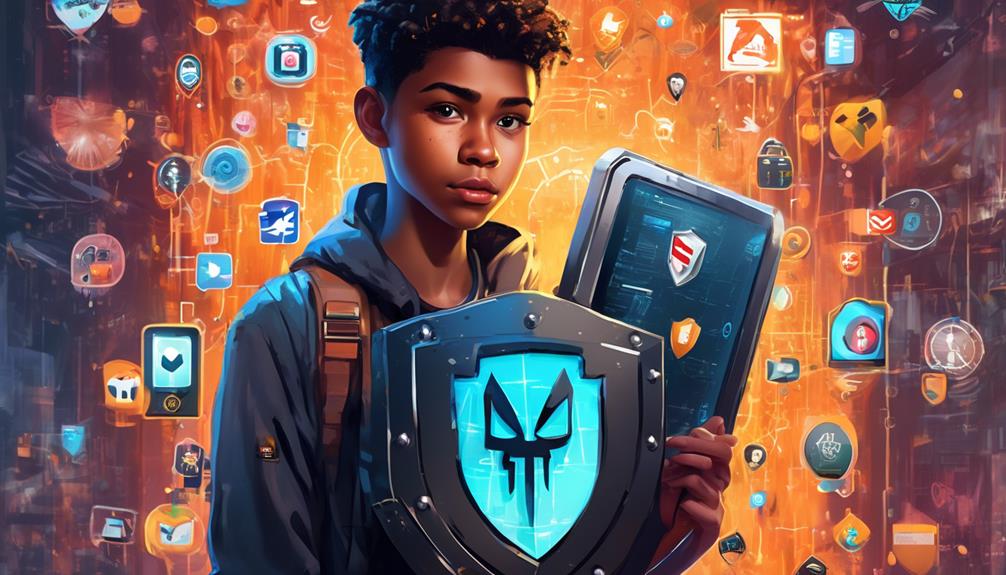As the digital era dawns upon modern childhood, screens light up children's faces. They explore a virtual world with undefined rules. In this growing digital realm, teaching kids polite online behavior is as vital as real-world manners. Parents and educators find this a new challenge. They aim to imbue respect, privacy, and kindness in digital interactions. These guardians help young netizens share information securely and avoid online disputes. Additionally, they teach how to spot scams and report rudeness. Balancing exploratory freedom with digital citizenship duties is key. The discourse on how to nurture net etiquette is complex and evolving. Questions arise about the effectiveness of present methods and potential new ones. As discussions continue, one fact remains evident. Today's youth are shaping the internet's future culture with every keystroke. It's crucial to reflect on the legacy they're creating.
Understanding Online Etiquette

Navigating the digital realm, children must learn the importance of online etiquette. It parallels manners in the real world, indeed. Digital manners are crucial; they underpin respectful interactions without tone or body language. Engaging online, kids should grasp their words' impact, as they can deeply affect others.
Netiquette norms provide a thoughtful expression framework for kids. They navigate internet social situations with utmost care. These guidelines prompt children to ponder before clicking, realizing that real emotions lie behind profiles and usernames. By fostering empathy and responsibility, kids contribute to a welcoming digital community.
When commenting on a post, joining virtual classes, or gaming online, children practice netiquette. Consequently, they build positive connections and experience a sense of larger community belonging. Grasping online etiquette is essential; it ensures children do more than coexist—they thrive in the digital expanse.
Respecting Privacy Boundaries
Children must be taught to respect privacy boundaries online just as they would in face-to-face interactions, safeguarding personal information both theirs and others'. It's crucial for them to understand the significance of confidentiality importance in the digital world. When they're online, sharing someone else's details without permission is not just impolite—it can lead to uncomfortable, even harmful, situations.
Digital consent is a term that needs to be part of every child's vocabulary. It means actively agreeing to share information and respecting others' decisions not to share. Kids should always ask for consent before posting photos or personal details about someone else. This isn't just about being courteous; it's about creating a safe community where everyone feels their boundaries are honored.
Educating children on the potential risks of oversharing helps them see the bigger picture. They'll recognize that once something is out there, it's hard to take back. By instilling a sense of responsibility for their digital footprint, they learn to protect not only their privacy but also that of their friends and family.
In an online culture where belonging is key, respecting privacy is a cornerstone of building trust and camaraderie. When kids practice these principles, they contribute to a respectful and secure online environment for all.
Communicating Kindly

Respecting online privacy is key to digital etiquette. Importantly, it teaches kids to communicate kindly within internet communities. Social media, gaming, and educational platforms connect them. Remember, behind every profile is a person with feelings.
Empathy training is critical for inclusivity. It teaches children to consider others' perspectives. Consequently, they learn the impact of their messages. It's vital to note that tone is hard to read online. Hence, selecting words with care is essential.
Conversation starters can foster positivity. For instance, phrases like 'I see your point' create connections. They also prompt further discussion and understanding.
Teaching kids to be kind online fosters community. Ultimately, it makes the digital world welcoming for all.
Sharing Information Safely
Ensuring safe sharing of personal information online is a crucial skill for young internet users. Cybersecurity basics aren't just for tech experts; they're essential for anyone navigating the digital world, especially children who are still learning the ropes. By understanding the importance of information verification and the potential risks of oversharing, kids can protect themselves and foster a safer online community.
To keep them engaged and informed, consider these vital tips:
- Never Share Personal Details: Remind kids to keep information like their home address, phone number, or school name private.
- Think Before You Click: Encourage them to verify the legitimacy of requests for information before responding.
- Privacy Settings Are There for a Reason: Teach them to use privacy settings on social platforms to control who sees their information.
- Cybersecurity Is Everyone's Business: Explain that protecting personal information helps keep everyone safe online.
Avoiding Digital Conflict

To harmoniously navigate the online world, kids must learn strategies to avoid digital conflict. The internet is an information hub. However, it can also be a hotbed for misunderstandings. Therefore, kids should learn conflict resolution techniques. These techniques foster community and understanding.
Empathy training is crucial in this process. By considering others' feelings, children are more thoughtful. Consequently, they're less likely to escalate tensions. For example, they should pause before responding to provocative messages. This reflection helps them understand the potential impact of their words. Encouraging questions over assumptions can prevent many conflicts.
Furthermore, recognizing heated situations is beneficial. In such cases, stepping away is necessary. Kids can seek advice from trusted adults. Additionally, they can use online tools for managing digital interactions. By developing these skills, kids avoid unnecessary online conflicts. Moreover, they contribute to a respectful, inclusive digital community.
Recognizing Scams and Threats
As children navigate the internet, they must learn to spot fake offers that can lead to scams. They should know that protecting their personal information is crucial in maintaining their online safety. Educating kids on these dangers equips them to recognize and avoid potential threats while they're online.
Spotting Fake Offers
In the digital realm, kids must remain vigilant to avoid scams and fake offers, which pose risks to their safety and privacy. Becoming a savvy online user involves developing consumer awareness and sharpening deal verification abilities. It's essential for young internet users to recognize the signs of a scam, especially when an offer seems overly generous.
To maintain vigilance, consider the following steps:
- Firstly, question unrealistic promises. Offers promising quick, effortless rewards are often deceptive.
- Secondly, always double-check the source. Confirm the offer's legitimacy by consulting other websites and reading reviews.
- Thirdly, guard your personal information carefully. Share private details only with trusted, secure sites.
- Lastly, seek guidance from an adult. If uncertain, ask a parent or guardian to examine the offer.
Educating children on these strategies helps integrate them into the online community, ensuring their protection.
Guarding Personal Information
Children should guard their personal details like hidden gold, sharing only when vital. This cautious approach helps avoid online dangers. They must realize that every shared detail enlarges their digital trace. Teaching them about password importance is crucial for securing their information. It's imperative they learn to create robust, distinct passwords and update them frequently. Encouraging participation in privacy-valuing communities builds a sense of inclusion and respect. Through this education, children become informed digital citizens, adept at safely exploring the online realm.
Reporting Unkind Behavior

When children face unkind behavior online, it's vital they identify it. Moreover, they need to know how to report it. They must feel capable of reporting abuse, whether experienced or observed. Consequently, this ensures a safer digital space for all. Providing clear reporting steps can assist. Thus, kids can act without feeling swamped or unsure.
Recognizing Hurtful Interactions
Understanding how to identify and report hurtful online interactions is crucial for young internet users. It involves vigilance and recognizing subtle, insidious cyberbullying signs. Importantly, empathy training significantly aids kids in understanding their actions' impact. It also helps them spot when peers are targeted. Here are essential pointers:
Firstly, look for sudden changes in a friend's online behavior or mood shifts. Secondly, notice if someone is consistently excluded from online games or group chats. Additionally, listen for negative or demeaning comments that may signal cyberbullying. Finally, be aware of repeated harassment, such as continual mean messages or hurtful comments.
Steps for Reporting Abuse
When children face unkind behavior online, they must know the steps to report abuse effectively and safely. Firstly, they should capture screenshots or save evidence, ensuring a clear record of the incident. Subsequently, children should confide in a trusted adult, such as a parent, teacher, or guardian. This person can provide support and help navigate the reporting process. Moreover, reporting the abuse directly to the involved platform is critical. It can lead to appropriate cyberbullying consequences for the perpetrator.
Frequently Asked Questions
How Can Parents Effectively Monitor Their Children's Online Behavior Without Invading Their Privacy?
Parents can establish a balance by implementing parental controls. Additionally, they should encourage open dialogue, which ensures children feel supported online. This approach helps kids navigate the digital world's complexities effectively.
What Are Some Age-Appropriate Online Games or Platforms That Encourage Polite Online Behavior for Kids?
'Respect begets respect.' Thus, games such as Club Penguin Rewritten and Animal Jam encourage digital etiquette. With robust game moderation, they are ideal. Youngsters seeking a virtual sense of belonging can benefit greatly from these platforms.
How Do Cultural Differences Impact What Is Considered Polite Online Behavior for Children?
Cultural sensitivity influences children's web manners; norms differ globally. Comprehending these differences promotes inclusive dialogue. Consequently, it instills respect in youngsters for varied virtual societies. This understanding broadens their feeling of international inclusion.
What Role Do Schools Play in Teaching Kids About Polite Online Behavior, and How Can They Collaborate With Parents?
Schools ground children in the digital realm by incorporating a digital etiquette curriculum. Through comprehensive teacher training, they collaborate with parents. Together, they guide students in understanding the internet's complexities. This partnership cultivates an online environment of community and mutual respect.
How Can Children With Learning Differences or Disabilities Be Supported in Understanding and Practicing Polite Online Behavior?
Visual aids and tailored guidance are utilized to assist children with disabilities. Consequently, this approach promotes inclusion, integrating each child into the digital community.
Conclusion
In the digital realm, it is essential for young users to exercise kindness. Additionally, they must respect privacy boundaries. Importantly, they need to share their online experiences responsibly. Moreover, communicating with a gentle touch on the keyboard is advisable. When conflicts arise online, wisely choosing to step away is beneficial. Furthermore, identifying deceptive users is critical for their safety. By taking a stand against rudeness, they contribute to a peaceful internet environment. Equipping children with these strategies ensures the web upholds dignity and empathy.



